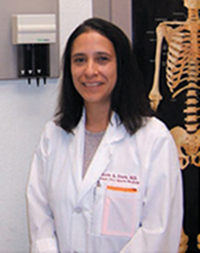 Why did you choose your specific health professional career?
Why did you choose your specific health professional career?
When I was in medical school, I wanted to choose a specialty that would be broad and give me opportunities to go into a sub specialty, so internal medicine was that field. One of the biggest decisions students have to make when they are in medical school is deciding on surgery or deciding on how much direct patient care is desired in one’s career. After completing my Internal Medicine residency, I did a Primary Care Sports Medicine Fellowship at the University of Oklahoma. This one-year fellowship program provided me with additional training in the treatment of medical problems affecting athletes and in orthopedics.
What experiences did you have to make sure this profession was right for you?
Of all the experiences that led me to go into this profession, I would have to say that seeing my family on the reservation deal with the challenges of getting adequate health care and having good physicians take care of them was a big influence on my choice of profession. Seeing my relatives really struggle with misdiagnoses and not knowing if they were going to have the right care made a big impact on me when I was younger. My father is a physician, and he was positive role model for me as well. Growing up in a family with a physician is important because it impacts you and gives you a significantly different outlook on your life.
Describe any obstacles or barriers to success that you encountered along your health professional career path and how did you overcome them?
As far as obstacles and barriers to success, I think that probably the biggest challenge was going from high school to college. I don’t think high school prepared me for my college experience. I went to college at Stanford University. It was extremely challenging getting through my initial premedical courses. In addition, it was difficult being away from home at the age 18. Also, I was trying to figure out for sure if medicine was the direction I wanted to go. As a premedical student in college, I was assigned to an American Indian medical student, called my “big sib.” She was one of my mentors and helped me get through some of the tough times where I may have doubted my capabilities. She was there to give me positive encouragement, which was so critical to my success especially early on in college. She was always telling me not to let things stand in my way, even if it was just one or two college courses that I felt were really challenging. She was very supportive of me. She definitely helped me through some of the obstacles and barriers in college. To this day, we are still close friends. Once I was in medical school, there were challenges with the course work and demands on my time. When I was preparing for exams in medical school, I really needed to take extra time to prepare for them. I often met with professors and teaching assistants and worked with individuals trained in study skills, time management and exam preparation.
What do you do in your current job?
In my current job, I do general internal medicine and sports medicine. I see patients with a variety of problems such as the common cold, sore throats, migraine headaches, and stomach problems. I take care of a number of acute issues, meaning illnesses or health problems that patients have recently encountered. I do have a few patients whom I care for with chronic diseases such as diabetes, asthma, and high blood pressure. I also work in the urgent care clinic where I treat patients with head injuries, lacerations, shoulder dislocations, motor vehicle accidents, etc. In addition, I have worked as a volunteer team physician for the department of athletics where I covered events and games to be available in the event that athletes were injured. At Campus Health, I also take care of club sport athletes who are injured or get sick.
What advice do you have for American Indian/Alaska Native students who are interested in health careers?
I would say that students should make sure that they know which health care career they like, because some health care careers, such as being a physician, are very demanding from initial preparation to completion. Being a doctor is a life career. A lot of preparation goes into career decision-making and so you want to be sure that you are passionate about your choice of career. Being a physician takes several years of training, especially if you want to go into a surgical or medical subspecialty. The number one thing is to make sure you want to go into a health career before you start down that path. Once you’ve decided on a health care career, try to spend as much time as you can figuring out if it is right for you based on shadowing experiences, research, or by talking to professionals in your chosen field to get a good idea what their career and life is like. While shadowing health care professionals or performing research, use that opportunity to make good connections with the people and hopefully, those professionals will write your letters of recommendation. I think that students should get as much experience and exposure as possible related to their chosen health career field.

